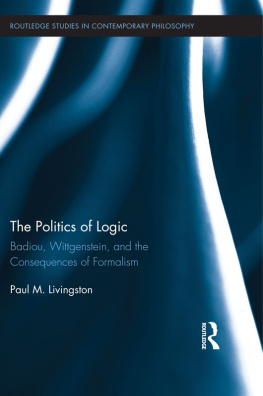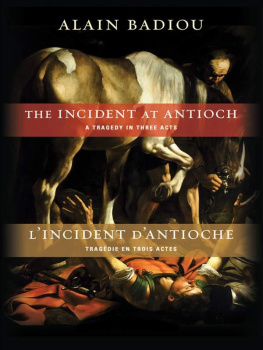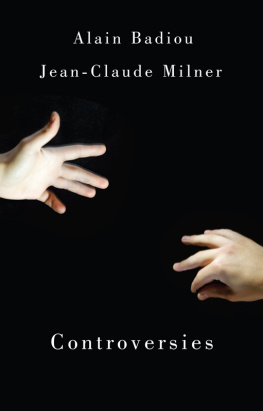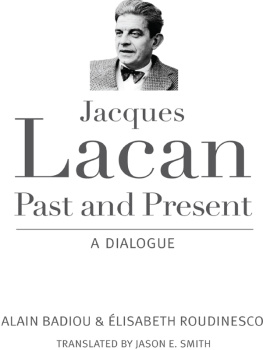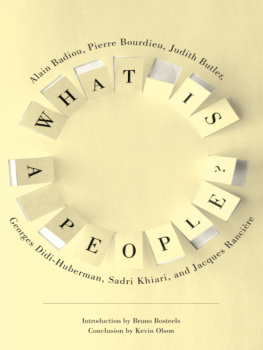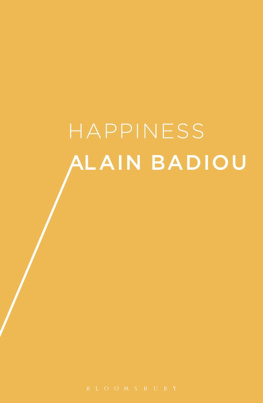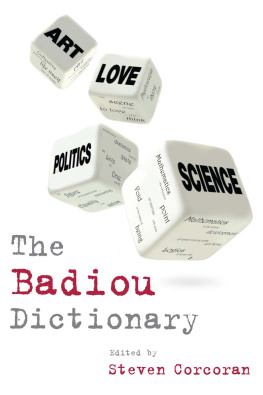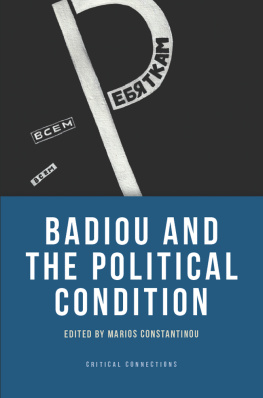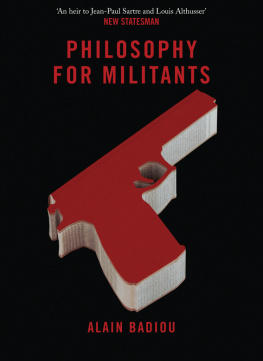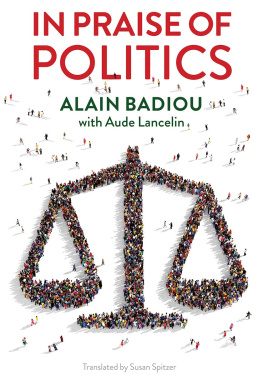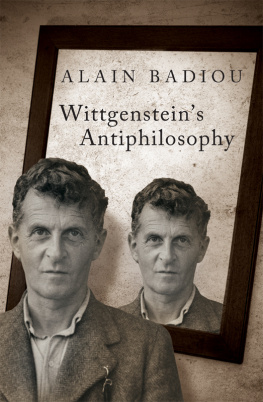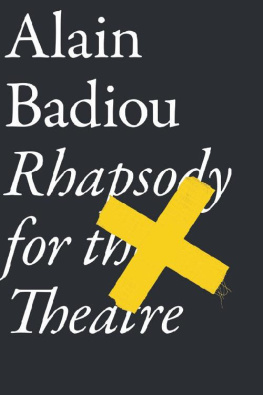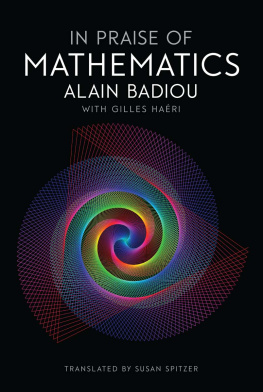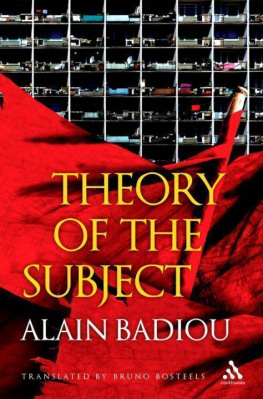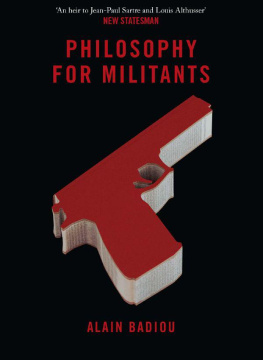
Very few philosophers can boast, not only of Paul Livingstons breadth, but of the charity with which he takes stock of our present philosophical situation. In showing how this situation counts as one, he does not merely sum it up; rather, he produces within it what should be seen as a major philosophical event.
Prof. Andrew Cutrofello
Department of Philosophy
Loyola University, Chicago
The Politics of Logic
Routledge Studies in Contemporary Philosophy
1 Email and Ethics
Style and Ethical Relations in Computer-Mediated Communication
Emma Rooksby
2 Causation and Laws of Nature
Max Kistler
3 Internalism and Epistemology
The Architecture of Reason
Timothy McGrew and Lydia McGrew
4 Einstein, Relativity and Absolute Simultaneity
Edited by William Lane Craig and Quentin Smith
5 Epistemology Modalized
Kelly Becker
6 Truth and Speech Acts
Studies in the Philosophy of Language
Dirk Greimann & Geo Siegwart
7 A Sense of the World
Essays on Fiction, Narrative, and Knowledge
Edited by John Gibson, Wolfgang Huemer, and Luca Pocci
8 A Pragmatist Philosophy of Democracy
Robert B. Talisse
9 Aesthetics and Material Beauty
Aesthetics Naturalized
Jennifer A. McMahon
10 Aesthetic Experience
Edited by Richard Shusterman and Adele Tomlin
11 Real Essentialism
David S. Oderberg
12 Practical Identity and Narrative Agency
Edited by Catriona Mackenzie and Kim Atkins
13 Metaphysics and the Representational Fallacy
Heather Dyke
14 Narrative Identity and Moral Identity
A Practical Perspective
Kim Atkins
15 Intergenerational Justice
Rights and Responsibilities in an Intergenerational Polity
Janna Thompson
16 Hillel Steiner and the Anatomy of Justice
Themes and Challenges
Edited by Stephen de Wijze, Matthew H. Kramer, and Ian Carter
17 Philosophy of Personal Identity and Multiple Personality
Logi Gunnarsson
18 The Force of Argument
Essays in Honor of Timothy Smiley
Edited by Jonathan Lear and Alex Oliver
19 Autonomy and Liberalism
Ben Colburn
20 Habermas and Literary Rationality
David L. Colclasure
21 Rawls, Citizenship, and Education
M. Victoria Costa
22 Objectivity and the Language-Dependence of Thought
A Transcendental Defence of Universal Lingualism
Christian Barth
23 Habermas and Rawls
Disputing the Political
Edited by James Gordon Finlayson and Fabian Freyenhagen
24 Philosophical Delusion and Its Therapy
Outline of a Philosophical Revolution
Eugen Fischer
25 Epistemology and the Regress Problem
Scott F. Aikin
26 Civil Society in Liberal Democracy
Mark Jensen
27 The Politics of Logic
Badiou, Wittgenstein, and the Consequences of Formalism
Paul M. Livingston
The Politics of Logic
Badiou, Wittgenstein, and the Consequences of Formalism
Paul M. Livingston

First published 2012
by Routledge
711 Third Avenue, New York, NY 10017
Simultaneously published in the UK
by Routledge
2 Park Square, Milton Park, Abingdon, Oxon OX14 4RN
Routledge is an imprint of the Taylor & Francis Group, an informa business
2012 Taylor & Francis
The right of Paul Livingston to be identified as author of this work has been asserted by him in accordance with sections 77 and 78 of the Copyright, Designs and Patents Act 1988.
All rights reserved. No part of this book may be reprinted or reproduced or utilised in any form or by any electronic, mechanical, or other means, now known or hereafter invented, including photocopying and recording, or in any information storage or retrieval system, without permission in writing from the publishers.
Trademark Notice: Product or corporate names may be trademarks or registered trademarks, and are used only for identification and explanation without intent to infringe.
Library of Congress Cataloging-in-Publication Data
Livingston, Paul M., 1976
The politics of logic : Badiou, Wittgenstein, and the consequences of formalism / Paul M. Livingston.
p. cm. (Routledge studies in contemporary philosophy ; 27)
Includes bibliographical references (p. ) and index.
1. Political sciencePhilosophy. 2. Badiou, Alain. 3. Wittgenstein, Ludwig, 18891951. I. Title.
JA71.L595 2011
320.01dc22
2011006207
ISBN13: 978-0-415-89191-2 (hbk)
ISBN13: 978-0-203-80663-0 (ebk)
, , , ,
And the people of old, superior to us and living in closer proximity to the gods, have bequeathed to us this tale, that whatever is said to be consists of one and many, having in its nature limit and unlimitedness. Since this is the structure of things, we have to assume that there is in each case always one form for every one of them, and we must search for it, as we will indeed find it
(Plato, Philebus, 16cd)
.
But although the Logos is common the many live as though they had a private understanding.
(Heraclitus, fragment 2)
Methodological Preface
The aim of this book is to interrogate formal structures and results to determine their bearing on todays leading questions of social, linguistic, and political life. Because of the great scope and generality of this bearing, and its application across areas of contemporary thought that are often kept rigorously separate, this involves me in a project whose commitments may be heterodox in several ways. For one, the aim of interpreting formal-logical and metalogical results as bearing fundamentally on the structure of intersubjective language and collective life has suggested a traversal of the problems of political and social organization that is both a retrieval and a displaced repetition of the twentieth-century linguistic turn, nowadays so often and triumphantly dismissed. This means that here, as elsewhere, I have attempted to understand the implications of the twentieth-century philosophical recourse to language, its constitution and pursuit as a determinate object of investigation. But since the nature of language is not self-evident, I have nevertheless aimed never to assume a substantial being of language, or a specific determination of its forms, until and unless such determinations are clearly motivated by the formalisms themselves.
It may be helpful to state more generally some of the (primarily negative) principles that determine the method of this book with respect to the analysis of language and reflection on its forms.
- To begin with, I have not assumed any simple outside to language. For whether it is understood as the place of mute presentation to a simple aesthetic seeing beyond words, or the transcendental domain of an exemplary presence, the assumption of such an outside prejudices the problem of the limits of language, with which the present inquiry is much concerned. I have thus attempted never to foreclose this problem by allowing the formal analysis to submit to constraint from beyond by means of any simply assumed exterior. This is also, I believe, the key to purging contemporary critical thought of the remaining elements of theology or, equally, what has been called onto-theology, both of which characteristically operate by positing a privileged being beyond language as its external constraint and ultimate delimitation.
Next page
